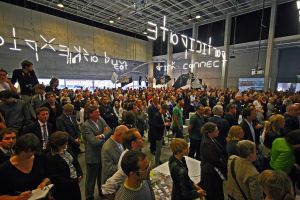

29 Sep 2009
The City on the Political Agenda

The opening weekend of the 4th International Architecture Biennale Rotterdam (IABR), Open City: Designing Coexistence, drew over 4.000 visitors, from the Netherlands and abroad.
Three exhibitions were opened, two in Rotterdam and one in Amsterdam, and an international symposium was held on the increasing role and impact of informal urban development.
At present, more than half of the global population lives in cities, and in 40 years, this percentage will increase to 75%. Although cities are responsible for more than 70% of all CO2 emissions, they are also the boosters of the global economy.
“In the 21st century, cities will be even more important than nation-states,” George Brugmans, director of the IABR announced at the Biennale opening. He advocated an “Urban Agenda” and remarked that national governments are lacking in coherent vision when it comes to the future of cities.
The rapidly growing importance of the city worldwide was emphasized in contributions by Dutch Ministers Jacqueline Cramer (VROM; Housing, Spatial Planning and the Environment) and Ronald Plasterk (OCW; Education, Culture and Science); the Mayor of Rotterdam, Ahmed Aboutaleb; the German cultural philosopher Peter Sloterdijk; the Aldermen of Urban Development from São Paulo, Elton Santa Fe Zacarias, and from Amsterdam, Maarten van Poelgeest; the architects Kees Christiaanse and Richard Burdett; the Chairman of Bouwend Nederland, Elco Brinkman; and Claudio Acioly, Chief Housing Policy Section, United Nations Human Settlements Program.
In Rotterdam, Minister Cramer argued that the climate crisis and the credit crisis in tandem will ensure that our view of the future of cities will change fundamentally. In her’s opinion architects, designers and urban developers can help meet the challenge of using the space within cities more intensively without sacrificing quality of life.
Safety, sustainability and social cohesion are important areas of special interest. In his speech during the opening ceremony in Amsterdam, Minister Plasterk argued that urban development is not so much about creating attractive, beautiful cities, but is most of all about ensuring that people live in “open cities” that are safe, sustainable, and abundant in social and cultural diversity.
The fourth edition of the International Architecture Biennale Rotterdam, Open City: Designing Coexistence focuses primarily on the social cohesion in the cities, and the contribution architects and urban developers can make to achieve this.
The IABR conducts research on cities and urbanization both in the Netherlands and abroad, whereby the emphasis lies on a multi-disciplinary approach in which architects, urban developers, sociologists, economists, developers, residents and governments work together on solutions for urban problems.
Minister Cramer: “I view the IABR as an international research laboratory, an open source setting in which various disciplines are combined to produce innovative insights and solutions. By working on the program as a united force, and through financial support in the long term, I firmly support this Biennale.”
The International Architecture Biennale Rotterdam (IABR) is an international urban research biennale founded in 2001 on the conviction that architecture is a public concern. It is an international event with exhibitions, conferences, lectures and other activities devoted to themes in the field of architecture and urban development. The 4th IABR will be held from September 24, 2009 to January 10, 2010 in Rotterdam, and this year’s edition will also include activities in Amsterdam. The 4th IABR’s central location is the NAi. This year’s theme is Open City: Designing Coexistence and the curator is the Dutch architect and urbanist Kees Christiaanse, a professor affiliated with the ETH Zürich, and founder and partner of KCAP Rotterdam. During the 4th IABR, a comprehensive program will be held at the NAi which will include debates, lectures, theater performances and film screenings. The director of the IABR is George Brugmans.
Note for the editor
For further information on the 4th IABR, press interviews and image materials, please contact: Eveline van Engelen or Xandra Nibbeling, tel. +31 (0)10 206 00 33, e-mail: pers@iabr.nl, www.iabr.nl.
Postal address
PO Box 1019
3000 BA Rotterdam, NL
t. + 31 10 2060033
f. + 31 10 4364335
info@iabr.nl
Visiting address
Westersingel 52
NL-3014 GV Rotterdam